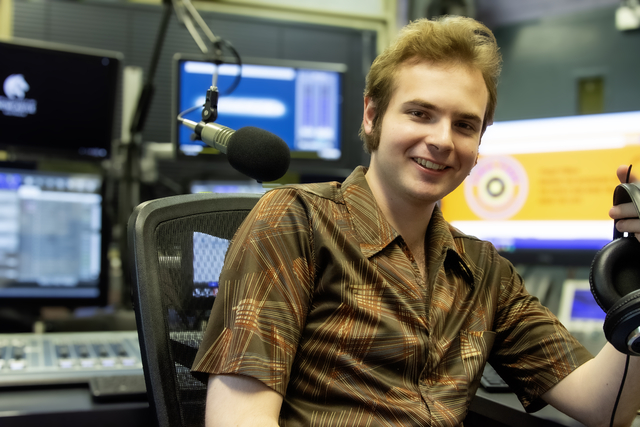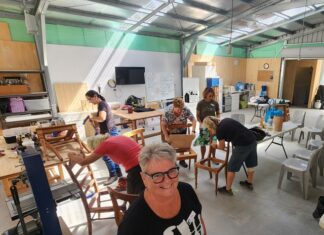A 9/11 survivor, police, firefighters, paramedics, war veterans and medical experts will join in the discussion on PTSD as Noosa community radio presenter Jack Hodgins delves into the topic in a 13-week series beginning this Sunday from 8 to 9am on his Wellbeing show on Noosa FM101.3.
Jack this week gave Noosa Today an insight into the series.
Q: When brings you to Noosa FM 101.3 to present Wellbeing?
A: We syndicate Wellbeing to Noosa FM via the Community Radio Network, so I am based at station 2NURFM in Newcastle but the lovely team at Noosa FM have been taking the show on their airwaves for quite some time now which is wonderful. I entered radio in late 2020 at 2NUR. I have always been a creative person and so radio seemed like something good to get involved in. Having never done radio before, at 17, I was given the role of presenter and producer for Wellbeing in April 2021. I have always been interested in mental health and have always thought it was such an important topic and so I was quite happy to learn more about mental health by doing this show. It has been a great adventure so far.
Q: What you do outside the radio?
A: Outside of radio most of my time is spent doing university related things. I am a second-year student at The Australian National University where I study a Bachelor of Arts Political Science major.
Q: What made you take on a 13-week series on PTSD?
A: I think at first it was the intrigue of it because I had heard the term PTSD but didn’t really understand completely what it was. I thought a lot of people may also be in the same boat of knowing the term but not understanding what it truly meant and so I thought it would be an interesting topic to investigate. The aspect of it being so prevalent also influenced me to make this series. The latest statistics tell us that 11 per cent of Australians will go through PTSD at some point in their lives, due to this, it’s possible that many Noosa FM listeners tuning in may have PTSD or know someone who does.
Q: Who will you be talking to across the 13-week series?
A: The series kicks off by talking with two academic PTSD experts: Professor Alexander McFarlane from the University of Adelaide and Dr Shaili Jain from the University of Standford. These initial two episodes will give listeners a strong foundation and good insight into the condition of PTSD. Listeners will then hear for the next three episodes from emergency service personnel affected by PTSD. A former police person, former paramedic and a current firefighter all talk about how their line of work has impacted them in the form of PTSD. The series continues with four episodes talking with war veterans about their PTSD journeys. The first veteran related interview is with Carol Schultz who shares what it was like growing up with her WW2 veteran father who had PTSD. The second veteran related interview is with Vietnam veteran Rodger Helle. Rodger’s perspective is important to the series as it was with this cohort of veterans that PTSD became a diagnosable condition. Prior to 1980 PTSD was not even a known condition. We also hear from Falkland War veteran Nick Martin and Iraq veteran Bobby Henline.
The series then looks into the PTSD journeys of two 9/11 survivors. The first to share their journey is Will Jimeno, a New York police officer who was trapped under The World Trade Center after it collapsed on September 11. In my interview with Will he talks about the events he went through on 9/11 and how today he manages his PTSD in his day-to-day life. People may remember Will as his story was depicted in the 2006 Oliver stone movie, World Trade Center. After my episode with Will, we also hear from a paramedic who received PTSD due to 9/11. The series then closes by talking with experts in the PTSD recovery field.
Q: How did you choose your guests for the series?
A: I knew the PTSD perspectives I wanted to cover on the show. It was just a matter of finding people who could talk about their PTSD from those perspectives. When going into this series, it was very important to me that I got all the perspectives I wanted to cover, and I did not stop searching for interviewees until I had covered all the perspectives I wanted to get. I reached out to PTSD organisations all over the world, reached out to book publishers of authors who had written PTSD memoirs and at times interviewees could put me in contact with people they knew that could talk from a perspective I wanted to cover on the show. It was an amazing journey putting it together.
Q: What do you hope will be the outcome for your listenings of the series?
A: All the interviewees we have had on the series all have a positive outlook on their condition. I hope this will allow Noosa FM listeners to see there is a lot of hope for those going through PTSD. The series is also greatly helpful for those who are family or friends of those going through PTSD. Not everyone likes to talk about their PTSD, so having the people on the show who are comfortable with discussing it, this can open new doors of understanding for those listeners that have important people in their lives going through PTSD. Even for those that are not touched by PTSD in any way, this series can still bring everyday listeners greater understanding into this important topic.









